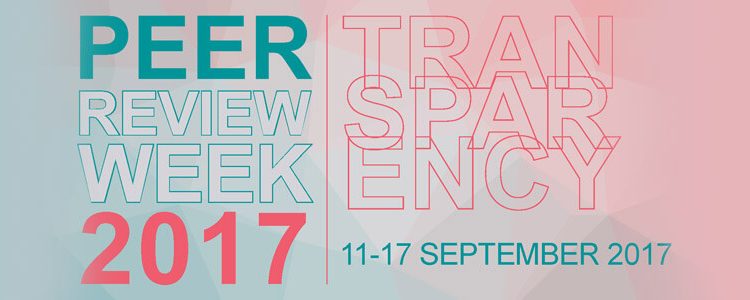Peer Review Week 2017: Transparency in Review

Peer review is one of the core activities upon which scholarly communication relies. However, the peer review process is typically closed and, as such; peer reviewers rarely receive credit for the invaluable service they provide to the scientific community. In order to address this problem, Peer Review Week was launched in 2015 and included online events and the hashtag #RecognizeReview, which gained some traction on twitter. Peer Review Week also exists to emphasize the importance of good peer review and the role that editors and reviewers play in safeguarding the process. In 2016, Peer Review Week saw the launch of Sentinels of Science awards being given to those making outstanding contributions to peer review. These awards, therefore, allowed researchers to receive recognition for reviews. Peer Review Week 2017 will build on this momentum and will kick off with a panel discussion on September 12 at the Peer Review Congress in Chicago. This panel will include representatives from the research, publishing, and funding spheres as well as peer review innovators and science commentators. Questions will be gathered ahead of time as well as from the audience.
The theme for Peer Review Week 2017 is “Transparency in Review” and this event will run from September 11-17. Nearly 30 institutions, including ORCID, are involved in planning the week. ORCID will contribute to the activities by publishing an analysis of the first two years of their peer review functionality, based in part on feedback from the organizations and researchers who have used it. ORCID will also host webinars for each region to explain how to use this functionality. The ORCID community will also benefit from being able to read blog posts which highlight the importance of transparency in scholarly communication.
Based on a recent study of the peer review process, one of the issues revealed is the fact that the reviewer pool is biased. This reviewer pool contains disproportionately more men than women and it is significantly more likely that your reviewer will be American. The former bias is due in part to authors and editors, especially male ones, being less likely to suggest female reviewers. This data indicates the need for even more transparency in the peer review process as well as for a larger reviewer pool.
Rigorous peer review is essential for the advancement of science. Peer Review Week 2017 will continue the tradition of ensuring that the work of reviewers is properly recognized while discussing the need for transparency in review. The discussion planned for the Peer Review Congress should also result in valuable insight into the impact of the peer review process on scholarly communication. ORCID also has several events planned to contribute to the Peer Review Week. All in all, Peer Review Week 2017 is shaping up to be very interesting. You can keep up with the events on twitter by following @PeerRevWeek and using the hashtag #PeerRevWeek17.
.









